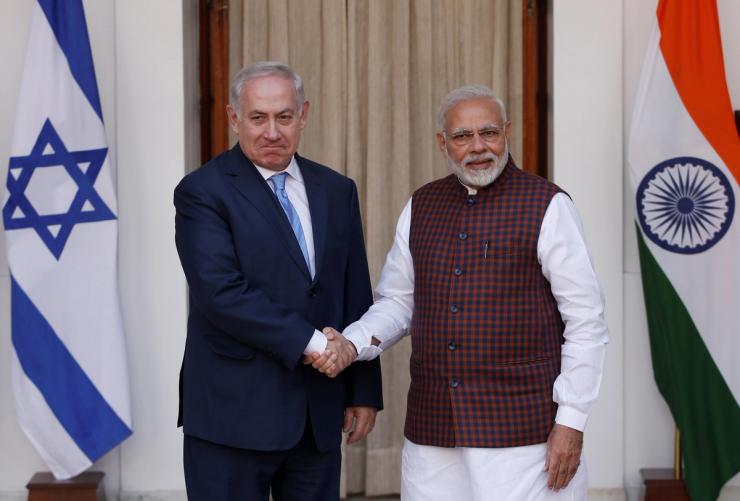The News
India’s Prime Minister Narendra Modi issued a strong statement expressing solidarity with Israel in a significant diplomatic moment for a country that has historically taken a more neutral position in international conflicts, including the ongoing Ukraine war.
The brutal assault by Hamas on Israeli civilians and Israel’s intense retaliation on Gazans is being exploited by online rightwing factions in India to perpetuate their own nationalist anti-Muslim propaganda.
SIGNALS
Modi and Israeli Prime Minister Benjamin Netanyahu’s close bond has often been described as a “bromance,” writes Kavita Chowdhury for The Diplomat. India historically did not consider itself an ally of Israel, and diplomatic relations were not established until 1992 because many anti-colonial Indian leaders sympathized with the Palestinian cause, viewing their struggles as a consequence of British imperialism. But that resistance changed in 2014 with the election of Modi, whose Bharatiya Janata Party and its Hindu nationalist followers champion “Israel’s exclusionist policies toward Palestinian Muslims. They also want India to mirror the Israeli model of a muscular military state, Chowdhary argues.
Hindu nationalists sympathize with the religious significance of Israeli sovereignty, but many proponents of Hindutva have also historically admired Nazis, Siddharth Kapila writes for left-leaning Indian outlet The Wire. Some Hindu nationalist leaders have proposed using Nazi exclusionary policies against Jews as a way to purge India of Muslims, Kapila writes, with some of those ideas being subtly enshrined in national policies. India’s 2019 Citizenship Amendment Act, which accelerated the naturalization process for millions of non-Muslim refugees, was “deeply reminiscent of the Nuremberg Laws whereby the Nazis revoked Reich citizenship for Jews,” Kapila argues.
Rightwing Hindu groups and trolls are flooding social media with misinformation about the fighting in Israel and Gaza, branding themselves as the “digital champions” of Israel, according to regional Indian newspaper Siasat Daily. Several posts showing old footage of ISIS attacks and beheadings were purported as Hamas’s attacks on Israel and used to inflame anti-Muslim sentiment in India. “It’s a concerning development that amplifies the polarizing tactics employed by these groups, which can have severe implications for communal harmony and national unity,” a former sociology professor told the paper.
India is supporting Israel from its own vantage point, but doing so may be small win for Washington, which has been betting on New Delhi to adapt to U.S. foreign policy, particularly in containing China. India’s backing of Israel is in contrast to Ukraine, where Modi has refused to outright condemn Russia’s invasion, instead positioning India as a mediator between the West and Russia. Still, one expert told Newsweek that India’s foreign policy in the Middle East remains a “balancing act,” where its support of Israel is no secret but New Delhi continues building strategic partnerships with Arab countries like Saudi Arabia. “It’s early to say how India’s long-term equation will pan out...and I don’t see India particularly perturbed at this point,” said one academic.



